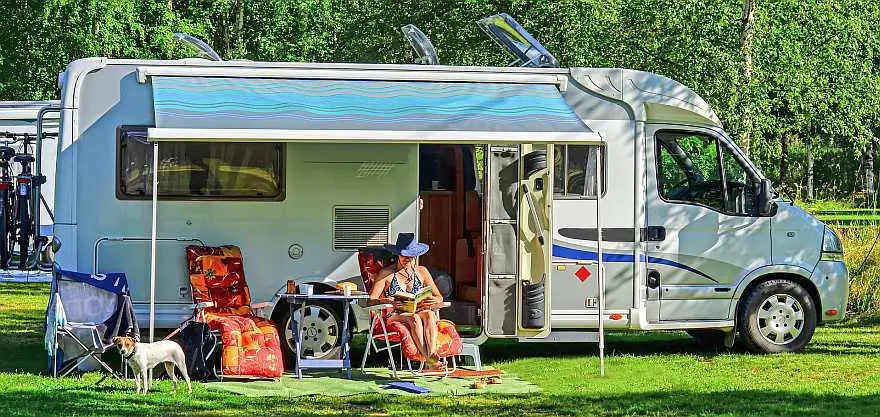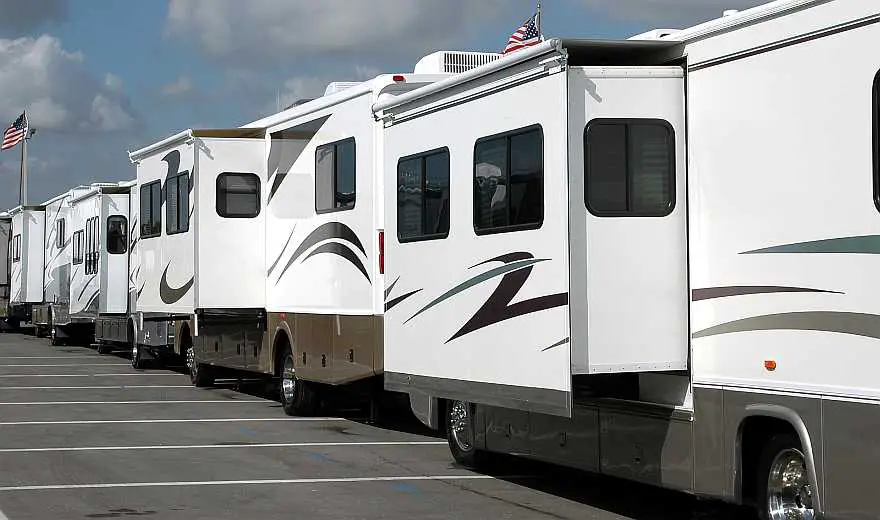Whether you’re a recent purchaser or own an older motorhome, storing an RV properly and well is vital to keeping it safe and in good condition.
When following sound policies aimed at keeping your RV protected during storage, it’s possible to reduce wear and tear, keep it operational when returning later, and minimize any risk of theft too.
Storing an RV
Here are 17 essential tips for storing an RV:
1. Choose the Best RV Storage
Sometimes, the RV is not in use for a few weeks or several months. Or you’re planning to fly out on vacation and leave it unattended? If you cannot park it in your driveway or your garage, then it’s necessary to consider all other possibilities.
Here are a few suggestions:
RV Parks: An RV Park is a good option if you’re leaving the area and won’t be able to check on the RV regularly. They can be booked for a block of time and the better parks have security too. As such, it’s a safer option than parking on the street or perhaps even in your driveway. RV parks aren’t cheap though, so it’s one of the costlier choices.
Do be aware of long term RV park rules to avoid contravening them and then being out of town when notified of an infraction of their rules. To find a good park, just Google “affordable RV park near me” and the search engine will give you a list.
Family or Friends: People that you know and are close to may have no issues with storing the RV in their driveway. It depends on the type of property they have as to whether they’ll have sufficient space for it though. If you have a camper and will be driving off in your truck, then that’s an easier sell than a Class-A motorhome or diesel pusher on their property.
RV Storage: Specialized facilities provide a range of RV storage options for different durations. Some are indoors for protection from the weather elements whereas others are outdoors behind a gate. Outdoor is usually less expensive but it is state-dependent due to differences in land purchase costs for a substantial facility. A good rule of thumb is to budget for $125 or so per month; cheaper deals might be available too.
Indirect Storage: One clever suggestion is when you have an upcoming engine service or repair work to be completed by an RV workshop. If so, the time it is when you’ll be absent. This way, the repair work will get completed and you won’t pay extra for the time that the RV is in their repair shop or waiting to be worked on.
2. Climate Thoughts
The climate plays a significant factor in the storage of an RV or motorhome.
Certainly, storing an RV in hot weather is a major concern if you’re in a hotter state. Whatever you’ve been doing to manage the heat won’t always be possible in your absence.
You’ll want to think about purchasing a dehumidifier because especially in the summer months, the heat and moisture will get trapped inside. The Pro Breeze model is a good runner and sips on the battery power too:
ⓘ If you click this link and make a purchase, we earn a commission at no additional cost to you.
Also, park in the shade where it’s safe.
Read Also: How to Keep Moisture Out of RV in Winter
3. Beware of Overhead Hazards
Overhead hazards include tree limbs and other potential obstacles.
In a storm, these could fall onto the roof of your RV.
Storm damage could include a cracked roof letting water in, smashed solar panels, hail damage to a skylight, or a branch going through a window.
All of the above would be much harder to handle when you’re miles away from where the storage site. Park in a place that doesn’t have overhead branches or trees nearby.
Even if that means the RV won’t be parked in the shade, the potential cost due to damages and inconvenience isn’t a worthwhile trade-off.
4. Ensure Proper Air Ventilation
Avoiding moisture build-up during storage is important. Insufficient ventilation can create mildew or mold that is unpleasant and hard work to remedy later.
An RV rooftop fan is the best option to keep the motorhome or camper from smelling musty. Ideally, a rooftop fan at either end of the RV is more effective for improved airflow.
Stagnant air and pockets of moisture are both to be avoided when storing an RV or leaving it parked up for a few weeks or months.
This Maxxair rooftop fan comes highly recommended:
ⓘ If you click this link and make a purchase, we earn a commission at no additional cost to you.
5. Don’t Leave the Awning Out

If you’re paying to park the RV in an RV park or a private plot, don’t make the mistake of leaving the awning out.
Leaving it extended will cause it to collect rainwater that could eventually break the canvas material.
Also, if the wind picks up, any metal poles that currently hold up the corners could easily become dislodged and then they’re akin to metal javelins flying through your windows!
Put away the awning and fully lock it down before leaving the RV.
6. Retract Any Slide-out

If you have an RV with a slide-out, don’t leave it extended out either.
Not only does it take up more storage space, but if using outside storage, it needlessly exposes the slide-out to the weather elements.
7. Give the RV a Spring Clean
Giving the RV a spring clean both inside and out provides at least two benefits:
Return to a Clean Home: It’s no fun to go away and return to a dirty home. Whether you’re just taking a break from your RV or plan to return and take it immediately on a trip, it’s no fun to get back and then need to spend half a day cleaning it.
Spot the Problems, Fix ‘em Early: When the RV is clean, it’s far simpler to spot any issues that should be taken care of before it’s stored. For instance, if there’s a window seal that’s cracked, that’ll let in water with outdoor storage arrangements. The water leak could potentially stain the carpet, wood, or paneling, and cause subsequent issues with mildew or mold later. So, clean it, and then inspect the RV for issues.
8. Let the Sun Inside
While you may be tempted to pull the shades down or draw the curtains across all of the windows for privacy, that creates problems.
Blocking out the sunlight loses the benefit of the warmth that it provides internally when stored in colder climates early or later in the year. The sunlight can get to the spots that heating might not reach as effectively too.
9. Heating Might Be Necessary
Heating might be needed to keep the RV warmer. This will remove condensation in the windows through evaporation and stop it from becoming a problem.
A cold and sometimes damper environment won’t be good for the furniture, fabric coverings, or bedding. Plan to heat the RV unless you’re in a hot environment that will remain so for all its time in storage.
10. Power Management
Power becomes an issue depending on how long the RV will be in storage and what you’ll need to keep running.
In damper environments, you’ll need to run a dehumidifier. In cold climates, a heater will be required to prevent bacterial build-up.
If it’s possible to plug the RV into hook-ups or shore power, do so. This is the best option here.
However, don’t ignore fully charging all your house batteries and the starter battery too. They will be drained somewhat depending on how old they are and how long the RV is left in storage
The 12-volt power will still be required for some appliances while you’re gone. Know how to tell if an RV battery is bad and what to do to replace it.
If you have solar installed, that can help to top up your 12-volt batteries when the RV is stored outdoors and not using hook-ups. To get the most out of your solar setup, be sure to brush up on your RV solar basics too.
11. Prevent Rodents from Finding their Way Inside
Remove all food, beverages, and any pet food remnants too. Vent the RV to expel any remaining food-related smells too.
Locate all openings, and place wire wool or physically block them to avoid any critters from getting inside. Remember, rodents are small and have collapsible vertebrae, so they can slide through the smallest of gaps.
Also look for tubes, hoses, and other possible entry points. Seal these up too.
Use mothballs near popular entrance points because rodents hate the smell of them.
12. Take Care of the Wheels and Tires
When storing the RV outside, consider how much the tarmac surface might heat and cook the tires.
One neat trick is to use leveling blocks on each wheel to get the tire off the ground. This should help to keep them cooler and drier to avoid damaging the rubber material.
It’s also not a bad idea to clean and check each tire over for any nails or other unwanted additions that should be removed before storage.
13. RV Cover?
An RV cover is something to consider if it’s being stored outdoors for months, rather than a few weeks. Covers with UV protection can deflect and avoid absorbing the sun’s rays that could damage the RV’s decals, fade the paintwork, etc.
With indoor RV storage, a cover prevents dust and debris from accumulating on the roof, windscreen, and windows.
However, it won’t prevent hail damage or damage from objects falling on the roof itself. It depends on the thickness and type of cover material as to the degree of protection it’ll offer for items brushing past or falling on the RV while parked up or stored.
14. Don’t Forget the Refrigerator/Freezer

If you’re expecting to possibly lose power at some stage or to have the RV in storage for more than a few days, we’d recommend removing all food and drinks from the refrigerator, powering it down, and defrosting the freezer compartment too.
A loss of power would cause the freezer section to defrost and flood part of the RV. This would then create water damage, water seepage, and more.
Leaving any food or drinks inside a fridge can tempt animals, rodents, or other critters to try to get inside.
15. Is Winterizing Necessary?
When storing the RV through the coldest months or right through winter, then you’ll want to empty all the water lines and use RV antifreeze to winterize your RV.
This is because, in freezing temperatures, water left in the plumbing system can freeze and expand breaking the water pipes. Flooding results and the damage to materials is costly.
16. Dump the Tanks
Outside of winter when it’ll be essential to dump the blackwater and greywater tanks, is it necessary to do so before putting the RV into storage?
We would suggest starting with a clean slate by emptying both tanks before leaving the RV. It avoids potential leaks. Also, unpleasant smells from the blackwater tank pushing up through the toilet into the RV living space isn’t nice to return to.
17. Security
If your RV security is currently lacking and you’ve been meaning to upgrade it, now is the time. Anything you can do to improve security is never a bad idea.
Choosing RV storage solutions with security guards and CCTV cameras is worth the extra cost to protect your investment.
Closing Thoughts
Storing an RV requires following some sensible steps to do it right. Doing so reduces the likelihood of any harm coming to either the interior or exterior during your absence.
Indoor storage is sometimes better than outdoor options, but security is paramount.
Lastly, do protect the interior from potential damage from moisture or little visitors while you’re away. You don’t want to return to a nasty surprise.
